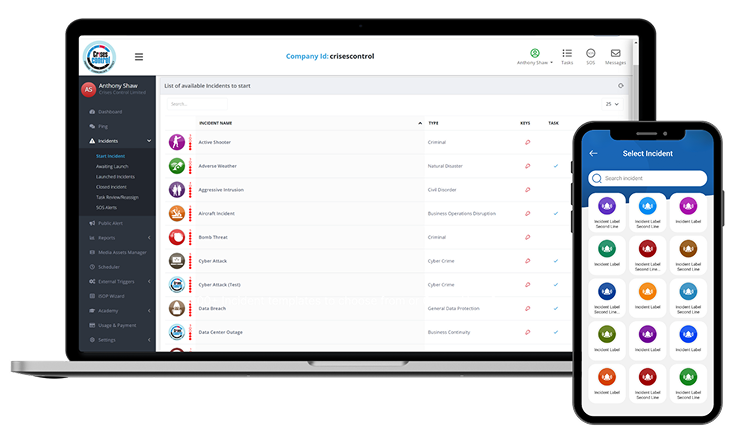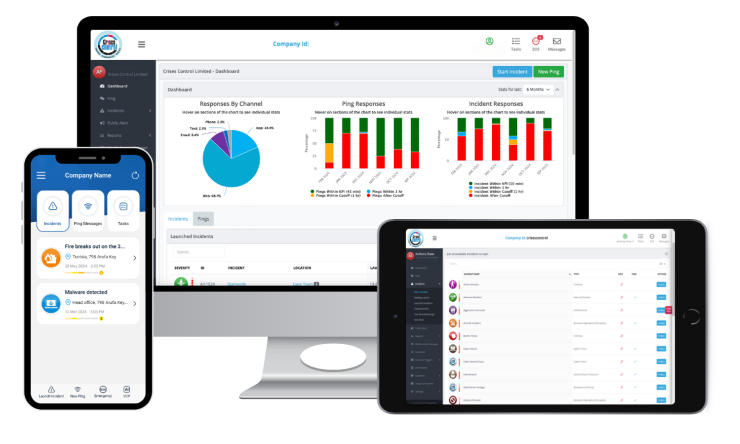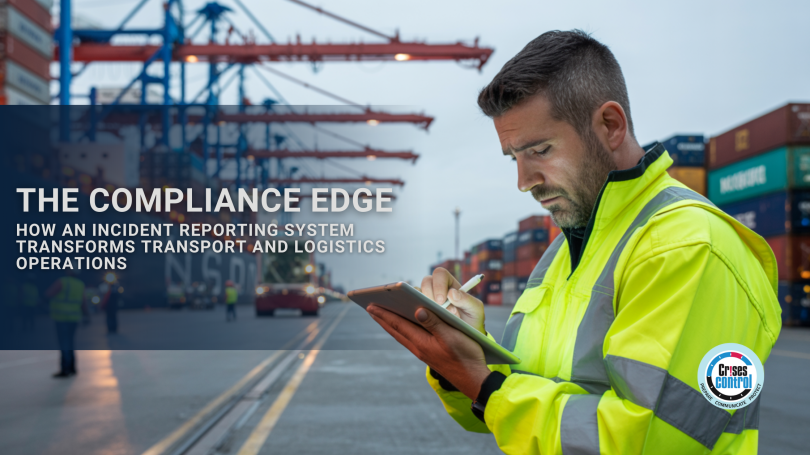Written by Anneri Fourie | Crises Control Executive
Introduction: Why Gaps in Reporting Put Transport and Logistics at Risk
Transport and logistics companies work in an environment where mistakes are not just costly, they can stop operations entirely. A missed vehicle safety check, a warehouse injury that isn’t logged, or a data breach without a documented response can all lead to investigations, large fines, or even the suspension of licences.
These situations are more common than many believe. The complexity of this sector means risks can appear in dozens of different ways: cross-border transport with different rules in each country, the movement of hazardous goods, large fleets spread over hundreds of miles, and workers based in ports, depots, and warehouses. Add in new cybersecurity threats and tighter regulations, and it becomes clear why compliance failures happen.
The good news is that these risks can be controlled. A dedicated incident reporting system for transport and logistics gives businesses the ability to capture, escalate, and store incident information instantly and securely. This is not just about ticking a regulatory box. It is about creating a clear, reliable record that satisfies regulators, protects staff, and keeps operations moving without unnecessary disruption.
Understanding the Role of an Incident Reporting System in Transport Compliance
An incident reporting system is far more than an online form or a spreadsheet. In transport and logistics, it is the backbone of safety and compliance management. It ensures that every type of incident, from a minor vehicle fault to a serious accident, is recorded in the right way, sent to the right people, and stored in a way that can be accessed quickly if needed for an audit or investigation.
For operators in the UK, EU, Middle East, or United States, the compliance demands are strict and varied. Examples include:
- Safety regulations such as the Health and Safety at Work Act in the UK or ADR rules for dangerous goods in the EU.
- Operational oversight like the Department for Transport and DVSA requirements for fleet safety checks.
- Cybersecurity readiness to meet obligations under frameworks like NIS2 in the EU or TSA directives in the US.
Without a robust system, important details can be missed. A verbal report might never be written down. A form could be incomplete. A photo of damage could be stored on someone’s personal phone and never reach the compliance team. These gaps are exactly what lead to non-compliance penalties and reputational harm.
The High Cost of Compliance Failures in Transport and Logistics
Compliance in this sector is a legal requirement but it is also an operational safeguard. When it fails, the consequences can be serious and expensive.
- Financial penalties are the most obvious risk. In the UK, DVSA has the authority to issue unlimited fines for serious safety breaches. In the EU and US, similar powers exist for transport regulators.
- Operational downtime is another. If an incident is not reported properly and an investigation is launched, an entire fleet could be grounded or a port operation suspended until the matter is resolved.
- Loss of contracts can follow too. Many clients, especially in high-value industries like oil and gas, defence, or medical supply chains, require proof that contractors have reliable compliance processes in place. A single failure can lead to the loss of future work.
- Reputational damage is harder to measure but can last for years. Clients, insurers, and regulators remember companies that fail to meet standards.
- A transport-specific incident reporting system reduces these risks by ensuring every incident is recorded, traceable, and accessible when needed.
Essential Features of a Compliance-Ready Incident Reporting System
Not all systems are designed for the realities of transport and logistics. A compliance-ready solution needs to work in challenging conditions and match industry requirements.
Multi-channel input
Drivers, warehouse workers, and port staff often work in areas with poor internet coverage. A good system should allow reports via mobile app, SMS, email, Microsoft Teams or even voice calls so that no incident goes unrecorded.
Real-time escalation
If a lorry is involved in a motorway accident or a warehouse sees a hazardous spill, every minute matters. The system should send alerts to safety officers, operations managers, or compliance leads immediately.
Regulatory alignment
Templates and workflows should match the reporting requirements for each operating region. A high-quality transport safety compliance software will already be set up for UK, EU, Middle East, and US regulations.
Secure data management
Compliance information is sensitive. The system should encrypt all data, store it securely, and ensure only authorised staff can access it.
Audit trails
Regulators often want to see exactly what was reported, when, by whom, and what actions followed. A reliable system will keep a full, time-stamped record of every step.
How Crises Control Supports Transport Compliance and Safety
Crises Control’s Incident Manager module is built to meet the demands of transport and logistics companies working across multiple sites and regulatory environments.
It allows staff to log incidents using whichever channel is available to them, whether that is the app, an SMS, an email, Microsoft Teams or a phone call. Each report is automatically time-stamped, linked to the person submitting it, and stored securely.
The system can escalate incidents instantly, sending notifications to the right people so that action is taken without delay. Regulatory reporting tools built into the platform mean operators can generate audit-ready reports in the correct format for their region.
Because all data is encrypted and protected, businesses can be confident that their records are safe from tampering or cyber threats. This combination of secure storage and clear audit trails makes inspections far less stressful and far more predictable.

Interested in our Incident Management Software?
The Incident Manager enables you to launch and manage incidents in seconds, leveraging real-time dashboards, task automation, multi-channel alerts, and mobile access to coordinate responses seamlessly across your organisation.
Real-World Scenarios Where Incident Management Makes the Difference
Fleet accident on a motorway
A driver involved in a collision uses the app to log the incident. Photos and GPS data are attached. The report goes straight to the fleet safety officer and the compliance team. A preliminary report for regulators is generated automatically.
Hazardous material spill at a port
Port workers identify a spill during cargo unloading. The health and safety manager initiates a pre-configured incident, and Crises Control logs all response actions to ensure compliance and rapid resolution.
Cybersecurity breach in logistics systems
An IT team member notices suspicious network activity suggesting GPS interference. They log it as a security incident, triggering immediate alerts to IT security and operations teams. Actions are recorded to meet reporting rules under NIS2 or TSA frameworks.
The Business Case for a Transport-Specific Incident Reporting System
Implementing the right system is not just about avoiding penalties. It is about protecting revenue, staff, and contracts.
- Reduced risk of fines and penalties because deadlines are met and reports are complete.
- Improved operational resilience since incidents are resolved more quickly.
- Stronger position when bidding for contracts by showing clear evidence of compliance capability.
- Better protection for staff and the public through faster escalation of safety issues.
Moving from Reactive to Proactive Compliance Management
Many operators still manage compliance reactively, dealing with problems after they arise. This is costly and disruptive. A compliance-ready incident management for logistics changes the approach entirely.
It gives operators visibility of risks as they develop, enables automated workflows that reduce delays, and ensures records are complete before regulators ever ask for them. This means compliance becomes a constant state, not an emergency project before an audit.
Crises Control’s platform supports this proactive model, embedding incident reporting into everyday operations.
Taking the Next Step Towards Compliance Confidence
Regulations change. New risks appear. Customer expectations rise. The transport and logistics companies that thrive will be the ones that keep compliance at the heart of their operations, supported by tools that are adaptable, reliable, and designed for industry realities.
Crises Control’s Incident Manager is one such tool. It enables accurate, secure, and rapid incident reporting, ensures regional compliance requirements are met, and gives operators the confidence to face audits without scrambling for information.
Conclusion: Your Compliance Edge Starts Now
Compliance failures in transport and logistics are too costly to ignore. The right incident reporting system gives you control over the process, ensures nothing is missed, and provides the evidence you need to satisfy regulators, protect staff, and keep operations running smoothly.
Crises Control’s Incident Manager offers all of this in a single platform.
Contact us today to arrange a free demo and see how it can give your operation the compliance advantage it needs.
Request a FREE Demo

